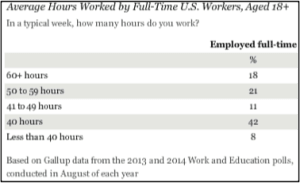 Gallup recently published findings that most full-time employees in America put in nearly a full day more than the standard 40-hours a week, clocking in 47 hours. Furthermore, nearly one in five employees work 60 hours per week or more. This grueling schedule can take a toll. As the Harvard Business Review reports “The (often unconscious) belief that more work equals more success is difficult to overcome, but the truth is that this is neither beneficial nor sustainable. Long work hours actually decrease both productivity and engagement.”
Gallup recently published findings that most full-time employees in America put in nearly a full day more than the standard 40-hours a week, clocking in 47 hours. Furthermore, nearly one in five employees work 60 hours per week or more. This grueling schedule can take a toll. As the Harvard Business Review reports “The (often unconscious) belief that more work equals more success is difficult to overcome, but the truth is that this is neither beneficial nor sustainable. Long work hours actually decrease both productivity and engagement.”
Not surprisingly, some employers have noticed and are proactively instituting policies to ensure a healthy work-life balance. CNBC reports that Troy, MI-based mortgage company United Shore Financial Services has put in place a “firm 40” policy, meaning employees are restricted to working a maximum of 40-hours-per-week; no more. “Your work every day is part of your life; it’s not your life,” says Mat Ishbia, president and chief executive officer of United Shore. “We want them to work hard for 40 hours and then go be with [his or her] families, go spend time outside of work, refresh, recharge and get ready for the next week.”
Ishbia says the company found that employees were burning out and as a result working very slowly. That negatively impacted productivity. The solution was to overstaff during high-volume times to ensure employees would not need to work beyond 40 hours-per-week. The CNBC report quotes: “There’s a lot of evidence, particularly when people get to the point of being exhausted, that their performance and their basic cognitive ability falls a lot.” The result for United Shore is that the company is saving money as a result of less turnover, happier employees and increased productivity.
Overseas, The Independent reports Sweden recently announced it was moving to a six-hour working day in an effort to increase productivity and make people happier. In fact, Toyota centers in Gothenburg, the second-largest city in Sweden, moved to the six-hour work day 13 years ago and reports increased profits, decreased turnover and a happier staff. “The eight-hour work day is not as effective as one would think. To stay focused on a specific work task for eight hours is a huge challenge.”
According to Maura Thomas, an international speaker and trainer on productivity, attention and effectiveness, leaders also need to be aware of the work environment they create, particularly when it comes to late night emails to teammates, reports the Harvard Business Review. “I’ve seen over the past decade how after-hours emails speed up corporate cultures – and that, in turn, chips away at creativity, innovation, and true productivity.” What’s more, after-hours emails and work could have a negative impact on said leader’s own well-being. “And this isn’t good for you, your employees, or your company culture. Being connected in off-hours during busy times is the sign of a high-performer. Never disconnecting is a sign of a workaholic. And there is a difference.”
